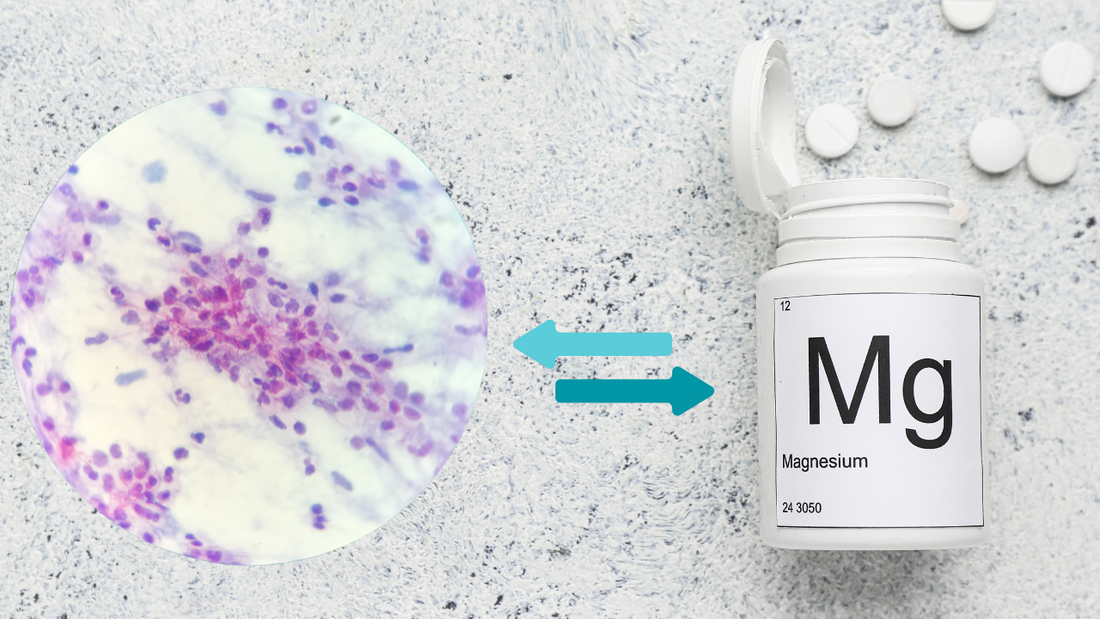Magnesium and Candida: Exploring a Potential Connection

Share
The Potential Link Between Magnesium and Candida: What You Need to Know
Disclosure: This article is provided by Zuma Nutrition, a company that sells dietary supplements, including magnesium and Candida cleanse products. The information presented is for educational purposes only and is not intended to diagnose, treat, cure, or prevent any disease. Always consult a healthcare professional before starting any supplement regimen.
The human body is a remarkable network of interconnected systems, where nutrients like magnesium play critical roles in supporting overall health. Emerging research is exploring intriguing connections between nutrients and specific health conditions, including the relationship between magnesium and Candida overgrowth. While the science is still evolving, this article explores what we know about magnesium’s potential role in maintaining a healthy balance of Candida in the body.
What Is Candida Overgrowth?
Candida is a type of yeast naturally present in the human gut, skin, and mucous membranes, coexisting with other microorganisms in a delicate balance. Under normal conditions, the immune system and gut microbiome keep Candida growth in check. However, factors like a weakened immune system, prolonged antibiotic use, high-sugar diets, or hormonal changes may disrupt this balance, potentially leading to Candida overgrowth. This condition has been associated with symptoms ranging from digestive discomfort to fatigue, though more research is needed to fully understand its impact (Reference 1).
Want to dive deeper? Check out our blog, “What Is Candida Albicans?” for a comprehensive overview.
Magnesium: A Vital Mineral for Health
Magnesium is an essential mineral involved in over 300 biochemical reactions in the body. It supports energy production, muscle and nerve function, blood sugar regulation, and immune health. Magnesium also has anti-inflammatory properties, which may contribute to overall wellness (Reference 2). Unfortunately, magnesium deficiency is common due to factors like poor diet, stress, and nutrient-depleted soils, potentially affecting immune function and gut health (Reference 3).
Exploring the Magnesium-Candida Connection
Preliminary research suggests a possible link between magnesium levels and Candida overgrowth. Low magnesium levels may weaken immune function and disrupt gut health, potentially creating an environment where Candida can thrive (Reference 3). While the exact mechanisms are not fully understood, scientists are investigating whether maintaining adequate magnesium levels could support the body’s ability to manage Candida growth.
Can Magnesium Supplementation Help?
Some studies have explored whether magnesium supplementation might play a role in supporting a healthy microbial balance. For example:
- Magnesium Citrate: This highly absorbable form of magnesium may help restore magnesium levels, potentially supporting immune function and creating a less favorable environment for Candida growth (Reference 5). However, more research is needed to confirm these effects.
- Magnesium Hydroxide: Commonly used as an antacid or laxative, magnesium hydroxide has shown potential antifungal properties in early studies, which may inhibit Candida growth in the gut (Reference 6). Further research is required to establish its efficacy.
- Magnesium Chloride: Preliminary studies suggest magnesium chloride may have antifungal properties that could help manage Candida in the gastrointestinal tract, though these findings are not conclusive (Reference 7).
While these studies are promising, the research is still in its early stages, and more rigorous clinical trials are needed to confirm magnesium’s role in managing Candida overgrowth.
How Might Magnesium Support Balance?
Magnesium may support the body in several ways that could indirectly influence Candida levels:
- Immune Function: Adequate magnesium levels are essential for healthy immune cell activity, which may help the body manage fungal imbalances (Reference 2).
- Gut Health: Magnesium supports gut motility and a balanced microbiome, which may contribute to a less favorable environment for Candida.
- Inflammation: Magnesium’s anti-inflammatory properties may help reduce inflammation associated with microbial imbalances.
However, magnesium supplementation should not be viewed as a standalone solution. A holistic approach, including a balanced diet low in sugar and refined carbohydrates, probiotic-rich foods, and stress management, is essential for supporting overall gut health and microbial balance.
Incorporating Magnesium into Your Routine
If you’re considering magnesium supplementation, consult a healthcare professional to determine the right form and dosage for your needs. Magnesium supplements, such as those offered by Zuma Nutrition, are available in various forms, including citrate, hydroxide, and chloride. Pairing supplementation with lifestyle changes, such as reducing sugar intake and incorporating probiotics, may support your wellness goals.
The Bigger Picture
The potential connection between magnesium and Candida highlights the importance of nutrition in supporting health. While early research is encouraging, the science is not yet definitive, and more studies are needed to fully understand how magnesium may influence Candida overgrowth. In the meantime, maintaining adequate magnesium levels through diet or supplementation may offer general health benefits, including immune and gut support.
At Zuma Nutrition, we’re committed to providing high-quality supplements to support your wellness journey. However, we encourage you to work with a healthcare provider to create a personalized plan that addresses your unique needs.
Disclaimer: The statements in this article have not been evaluated by the Food and Drug Administration. Zuma Nutrition products are not intended to diagnose, treat, cure, or prevent any disease.